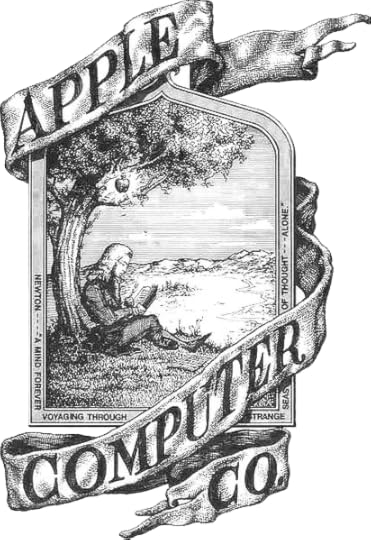Brian Clegg's Blog, page 150
January 11, 2012
Those eureka moments
 The original Apple Computer logoHistorians of science tend to downplay 'eureka moments' when a scientist suddenly has a great idea. 'Constructed after the fact,' they mumble into their beards. 'Real science isn't like that. It's a slow grind, a team effort. Fake memories. Blah, blah...' Arguably this says more about historians of science, and their lack of imagination, than real scientists. For while all eureka moments are certainly not true, I think many are.
The original Apple Computer logoHistorians of science tend to downplay 'eureka moments' when a scientist suddenly has a great idea. 'Constructed after the fact,' they mumble into their beards. 'Real science isn't like that. It's a slow grind, a team effort. Fake memories. Blah, blah...' Arguably this says more about historians of science, and their lack of imagination, than real scientists. For while all eureka moments are certainly not true, I think many are.To dismiss a couple of unlikely ones, I very much doubt that the original Archimedes jumping out of the bath story has any validity. And there's good evidence that Galileo didn't get a sudden understanding of gravitational pull while dropping balls of different weights off the leaning tower of Pisa. (The evidence for this is that Galileo never mentions it. It is only told by an assistant who was writing about Galileo near the great man's death. But Galileo was a superb self-publicist. If he had done it, he would have bragged about it.)
However I'd also like put forward a classic that I feel probably is true. Newton and the apple. I'm not saying that an apple hit him on the head - that is pure fiction - but I don't think it's at all unreasonable that seeing an apple fall sparked a chain of thought. Here's Newton's own words on the subject, related by the historian William Stukeley:
After dinner, the weather being warm, we went into the garden, and drank thea [sic] under the shade of some apple trees; only he and myself. Amidst other discourse, he told me, he was just in the same situation, as when formerly, the notion of gravitation came into his mind. Why should that apple always descend perpendicularly to the ground, thought he to himself; occasion'd by the fall of an apple, as he sat in a contemplative mood.The fact is that there is strong evidence that humans tend to come up with their best ideas when they are not sitting at their desk trying to work, but rather when they are only half conscious of what they are dealing with. Perhaps on a walk (I get most of my ideas walking the dog), driving, or in Newton's case, sitting relaxing. It feels right. So hands off, historians of science. Even if it wasn't true, this kind of story is useful as myth - but in this case there is every possibility that it was.
Image from Wikipedia
Published on January 11, 2012 09:50
January 10, 2012
Just go away
 Two words. Scottish independence. Please.
Two words. Scottish independence. Please.I'm sorry, I have no interest in keeping the Scots in the Union. The sooner they break off the better. Just think about it. No more Alex Salmond on UK television. It's worth it for that alone. No more Scottish MPs at Westminster. (It would be interesting if we had as few MPs of Scottish origin as they have MPs of English origin in the Scottish parliament. BTW, isn't Cameron a Scottish name?)
No more subsidies. No more need to fund postmen and medics and other vital services to go all the way to the Highlands and Islands. No more whingeing from Scottish politicians. (Actually there would be plenty of it, but hopefully it wouldn't make it onto our news.) Of course we'd lose out on North Sea Oil revenues - but it would be worth it. As would the mangling of the Union flag.
But please make it all or nothing. Any further devolution is no help. We'd STILL have all the whingeing. Still have their MPs at Westminster. And still see Alex Salmond.
It worked with the Americans. We've got on well with them (on the whole) since we've split. Please, let's have Scottish independence, sooner rather than later.
Published on January 10, 2012 10:05
January 9, 2012
I talks detox
 I'm writing this quickly before heading off to BBC Wiltshire to talk detox. They thought this would be rather a fun thing to discuss post Christmas and the New Year, and I'm delighted to oblige.
I'm writing this quickly before heading off to BBC Wiltshire to talk detox. They thought this would be rather a fun thing to discuss post Christmas and the New Year, and I'm delighted to oblige.Detox is one of those subjects that really gets me irritated at the way manufacturers and health shops rip people off. As usually presented, detox is total rubbish.
Let's break it down. What does detox mean? Removal of toxins - poisons - from the body. What are poisons? Pretty well anything taken in excess of an acceptable dose. Water, for example, is poisonous if you drink enough quickly. A couple of athletes have died as a result of water poisoning. (I think it dilutes your electrolyte levels sufficiently that your nervous system packs in.) Your body has brilliant systems for removing toxins - your liver and kidneys, for example - but if you shove too much in, it will have trouble getting rid of the bad stuff fast enough.
So what should you do to detox? It's so boring, which is why they make up all this garbage to sell products. All you need to do is cut down on the crap you shove in your mouth. Less fat, less sugar, more fruit (but not too much as that has a lot of sugar in it) and definitely more veg. A touch of exercise. And you've got detox perfected. Resultant expenditure - probably negative after cutting down on fatty and salty treats.
I was trying to look up the most infamous detox offender, Prince Charles' Duchy Herbals 'Detox Tincture' as an example, but they've gone all coy about it. The Duchy web page still tells us that for a mere £10 we can buy a little bottle, and that
Duchy Herbals Detox Tincture has been produced to help support the body's natural elimination and detoxification processes. It includes extracts of Dandelion and Artichoke, the latter of which is a well-known digestive aid, making it the ideal product to help kick-start your body after the festive period!But if you click the link to the Detox Tincture page, you get take to page still called 'http://www.duchyoriginals.com/detox_t...' but that tells you about sheep shearing. Hmm. Maybe Prince Charles doesn't want to fleece us any more.
Published on January 09, 2012 10:28
January 6, 2012
A toy to conjure with
When I was young I had an educational toy that was called something like an Electrokit (definintely not the Meccano Electrikit). It was a set of electronic components, each protected in a chunky housing with standard split-pin plug fittings at the bottom. You then got a series of circuit boards with appropriate sockets in and you could plug the transitors, resistors etc. in place to make up real working electronic devices.
 I can't find a picture of the kit or the door, so here's
I can't find a picture of the kit or the door, so here's
the Science MuseumAs far as I can remember, and I'm really dredging the depths of memory here, it was brilliant. I feel a real nostalgia for this kit. The ultimate thing you could construct was a radio, which was quite exciting, but for me this wasn't anywhere near as good as another project. The thing is, a radio was an everyday item, but you also got the chance to build something cool of practically Star Trek wonder.
Before I reveal what this project was, I ought to point out something I have since shown to my children at the Science Museum in London. I don't know if it's still there, but last time I went round this particular part of the mueseum I spotted an antique exhibit of an automatic opening door. The first time I went to the Science Museum, aged 6, this door with an 'electric eye' was absolutely mind boggling. You walked up to it, and it opened. Automatically. Like magic. I must have gone through it about a dozen times. This was the future. Really.
So given this context, here's my favourite project with that home kit. As well as the basic electronic circuitry you added a buzzer (and possibly a light) and a pair of wires. At the end of the wires was a little panel with a series of conducting bars. This panel broke the circuit - the buzzer didn't go off. But if the panel got wet, the water conducted electricity across the bars and the buzzer sounded, controlled by a transitor on the board.
So what you could do, for example, is tape the sensor to the side of the bath and leave it filling, careless not bothering to watch it. Surely it would overflow, causing terror and destruction? No! The amazing technology started to buzz and you could turn off the taps. Ah, joy, pure joy. This was twenty-first century living in the 1960s.
Picture from Wikipedia
 I can't find a picture of the kit or the door, so here's
I can't find a picture of the kit or the door, so here'sthe Science MuseumAs far as I can remember, and I'm really dredging the depths of memory here, it was brilliant. I feel a real nostalgia for this kit. The ultimate thing you could construct was a radio, which was quite exciting, but for me this wasn't anywhere near as good as another project. The thing is, a radio was an everyday item, but you also got the chance to build something cool of practically Star Trek wonder.
Before I reveal what this project was, I ought to point out something I have since shown to my children at the Science Museum in London. I don't know if it's still there, but last time I went round this particular part of the mueseum I spotted an antique exhibit of an automatic opening door. The first time I went to the Science Museum, aged 6, this door with an 'electric eye' was absolutely mind boggling. You walked up to it, and it opened. Automatically. Like magic. I must have gone through it about a dozen times. This was the future. Really.
So given this context, here's my favourite project with that home kit. As well as the basic electronic circuitry you added a buzzer (and possibly a light) and a pair of wires. At the end of the wires was a little panel with a series of conducting bars. This panel broke the circuit - the buzzer didn't go off. But if the panel got wet, the water conducted electricity across the bars and the buzzer sounded, controlled by a transitor on the board.
So what you could do, for example, is tape the sensor to the side of the bath and leave it filling, careless not bothering to watch it. Surely it would overflow, causing terror and destruction? No! The amazing technology started to buzz and you could turn off the taps. Ah, joy, pure joy. This was twenty-first century living in the 1960s.
Picture from Wikipedia
Published on January 06, 2012 09:37
January 5, 2012
Trying not to be Prejudiced
 I'm a great fan of Jane Austen, and love a good detective story, so was delighted to get the P. D. James follow-up to Pride and Prejudice, the murder mystery Death Comes to Pemberley for Christmas.
I'm a great fan of Jane Austen, and love a good detective story, so was delighted to get the P. D. James follow-up to Pride and Prejudice, the murder mystery Death Comes to Pemberley for Christmas.It was quite eerie to start reading it, as I had watched the film adaptation of P and P with Keira Knightley as Elizabeth Bennet just the evening before. It somehow made it particularly easy to immerse myself in the book - and I ought to stress that I'm not a picky traditionalist, so was not in any sense worried about what Ms James would do to the hallowed characters. (As credentials, I love Stephen Moffatt's modern day Sherlock).
Sadly, though, I can only be lukewarm about what I read. If I'm honest, P. D. James is not one of my favourite writers - I find her usual murder mysteries rather stiff and stilted. (In fact the best thing about the Dalgleish stories is the superb theme tune of the TV adaptation.) Although the Austen sequel is cleverly written, it seemed to lack that immense warm humour that is the absolute essence of Jane Austen. Elizabeth is little more than a bit part, rather than the central character. And at least once the author seemed to be using the book as a vehicle for her politics, when bizarrely the characters suddenly start discussing whether there ought to be a right of appeal in a trial (not available at the time), and how this would be absurd as it 'could presumably result in a foreign court trying English cases. And that would be the end of more than our legal system.' Presumably a pointed reference to European interference in UK justice.
Don't get me wrong, it wasn't a bad book. I was interested to read it to the end and enjoyed it. But I simply felt it lacked the energy and brilliance of an Austen, while it was too slow to develop to work as a murder mystery. Still, worth taking a look at Amazon.co.uk and Amazon.com.
To cheer you up a bit, here is that excellent theme music:
Published on January 05, 2012 08:34
January 4, 2012
The fight against racism must go on
Amidst the floods of coverage of the recent successful trial of two of the attackers of the murdered black teenager Stephen Lawrence, a crime committed 18 years ago, there have inevitably been a matching set of articles, TV and radio pieces on the nature of racism.
I read an article that seemed shocked that there was still racism in schools after all this time. To be shocked about this is to have a very poor understanding of human beings. The fact is we are naturally disposed to distrust, and at the extreme to hate, those who are different, whether based on race, religion, appearance (red hair, for instance), accent - pretty well anything. If we can't find anyone who is different enough, we will set up an arbitrary difference, which to an outsider looks pathetic.
In olden days, when few travelled far enough to know anyone really different, English people looking down on the Irish, those from Lancashire and Yorkshire hated each others guts (despite being almost indistinguishable to outsiders), and if all that failed, most places had a local town which historically was regarded as being in some ways different or backwards, so providing the alien to shun or attack. Where I came from it was a town called Heywood. Although this 'localism' had pretty well died out by my time, a hammer was still jokingly referred to as a 'Heywood screwdriver.'
In a primitive, dangerous tribal environment, any and every stranger, anyone who is different, even if they are just from the next town, is a potential threat. Thankfully we have moved on. But just as our bodies are still functioning as if we lived on the diet of 100,000 years ago, so our brains still have this inbuilt fear and distrust of the alien. You can't turn it off in a generation, or ten generations. It will take much longer. We have pushed out our boundaries, but we still automatically find an alien somewhere.
You may say 'But many of my friends are from different races, creeds, appearances, class etc.' This misses the point. Once you get to know a person, that individual is no longer 'them'. The British class system survived so long because there were institutions in place to ensure that you didn't have to mingle with 'them', so plenty still remained alien. But the ability to shift an individual from 'them' to 'us' (probably developed because the early tribes tended to ensure genetic variation by stealing mates from other villages) doesn't mean the fundamental fear and distrust of the alien isn't still there. We all have it. So have our children, and so will many generations to come.
The fight against racism - and all the other -isms is not over. Our current enlightened view (not shared by the whole world, let's face it) is a triumph of mind over nature. We need to sustain this mental battle indefinitely. It's incredibly naive to think it has gone away and we can sit on our laurels. We need to keep up the steady pressure for the long haul.
I read an article that seemed shocked that there was still racism in schools after all this time. To be shocked about this is to have a very poor understanding of human beings. The fact is we are naturally disposed to distrust, and at the extreme to hate, those who are different, whether based on race, religion, appearance (red hair, for instance), accent - pretty well anything. If we can't find anyone who is different enough, we will set up an arbitrary difference, which to an outsider looks pathetic.
In olden days, when few travelled far enough to know anyone really different, English people looking down on the Irish, those from Lancashire and Yorkshire hated each others guts (despite being almost indistinguishable to outsiders), and if all that failed, most places had a local town which historically was regarded as being in some ways different or backwards, so providing the alien to shun or attack. Where I came from it was a town called Heywood. Although this 'localism' had pretty well died out by my time, a hammer was still jokingly referred to as a 'Heywood screwdriver.'
In a primitive, dangerous tribal environment, any and every stranger, anyone who is different, even if they are just from the next town, is a potential threat. Thankfully we have moved on. But just as our bodies are still functioning as if we lived on the diet of 100,000 years ago, so our brains still have this inbuilt fear and distrust of the alien. You can't turn it off in a generation, or ten generations. It will take much longer. We have pushed out our boundaries, but we still automatically find an alien somewhere.
You may say 'But many of my friends are from different races, creeds, appearances, class etc.' This misses the point. Once you get to know a person, that individual is no longer 'them'. The British class system survived so long because there were institutions in place to ensure that you didn't have to mingle with 'them', so plenty still remained alien. But the ability to shift an individual from 'them' to 'us' (probably developed because the early tribes tended to ensure genetic variation by stealing mates from other villages) doesn't mean the fundamental fear and distrust of the alien isn't still there. We all have it. So have our children, and so will many generations to come.
The fight against racism - and all the other -isms is not over. Our current enlightened view (not shared by the whole world, let's face it) is a triumph of mind over nature. We need to sustain this mental battle indefinitely. It's incredibly naive to think it has gone away and we can sit on our laurels. We need to keep up the steady pressure for the long haul.
Published on January 04, 2012 08:43
January 3, 2012
I'm back - paper back
 Ok, that title
I'm back - paper back
didn't really work as a pastiche of James Bond introducing himself. But I am delighted to be starting the new year in the way I hope to be going on with montonous regularity, with a new book out - to be precise the paperback version of Inflight Science.
Ok, that title
I'm back - paper back
didn't really work as a pastiche of James Bond introducing himself. But I am delighted to be starting the new year in the way I hope to be going on with montonous regularity, with a new book out - to be precise the paperback version of Inflight Science.If you are wise, attractive and generally wonderful enough to have already acquired a copy of Inflight Science you may be puzzled and be saying 'But it was already a paperback'. This reflects the way the first edition was in a rather strange format called 'trade paperback' which is half way between a hardback and a paperback. (See this post for more info on the concept.) What has now come out is the mass market paperback version. This is smaller and cheaper than the original - so even handier to slip in that pocket prior to a flight.
Unfortunately the publishers in their wisdom (and I'm assured there is a good reason) have only brought this version out in the UK - so in the US there's only the trade version, which is also still available in the UK, as it's rather snazzier to buy as a present. However, the Amazon.com price is very good on the chunkier version, so it's not too much of an issue.
So there we have it. Even more choice of Inflight Science possibilities. Even more affordable. What's not to love? Check it's web page for more info.
Published on January 03, 2012 09:28
January 2, 2012
Why are banks so stupid?
 A bank. As stupid as the rest, but at
A bank. As stupid as the rest, but atleast it looks interestingI can't believe the stupidity of banks. I'm not referring to all the usual reasons for hating bankers (like their bonuses and breaking our economy) - but because their computer systems are so rubbish.
A lot of this stems from their philosophical inability to recognize weekends and bank holidays. 'What, us, work like normal people in a service industry? Do us a favour?' You might think they do work at the weekend. After all many banks are now 'open' on Saturdays. But that is just a shadow, a ghost of a bank, to fool you into thinking they care. All the transactions they make at the weekend or on bank holidays are saved up to go through on the next 'working day', because their computers don't believe it is really possible to work at the weekend.
Here's one ludicrous example. I have a standing order that goes out on the first of the month. If I go online today, 2 January, which this year is a bank holiday because New Year's Day is on a Sunday, and try to change this standing order I'm presented with the following conflicting information. When's the next upcoming payment? 1 January 2012 (as it won't be processed until the 3rd). Can I change the next transaction? No because you can't change a transaction in the past. But I want to change the next one. In the future. Argggh.
Picture from Wikipedia
Published on January 02, 2012 11:13
December 30, 2011
What is job security?
 Umbrellas - not doing a lot of protectingWith all the sad news of job cuts and redundancies I feel a strange reversal of role coming over me.
Umbrellas - not doing a lot of protectingWith all the sad news of job cuts and redundancies I feel a strange reversal of role coming over me. When I left British Airways around 17 years ago to work for myself, lots of people said 'I couldn't do what you're doing. I'd love to be my own boss but I couldn't cope with the lack of job security.' It was a scary thought, coming out from under the protecting umbrella of an organization that paid your salary with satisfying regularity at the end of the month.
It's true that over the years there have been times when things have been very tight. There are no guarantees when you work for yourself. Your next bit of earnings won't just come drifting in, you've got to go out and find it. And yet the whole idea that I was doing something risky compared with those who stayed working for a company, or a public body, assumes that there is such a thing as a guarantee.
But now when I compare myself with someone who has been made redundant, I feel strangely secure. They suddenly have nothing come in. I don't doubt it's harder for me to get projects going at the moment, but on the whole I can find ways to keep going. In a sense I have more security because I can't be made redundant. There isn't a circumstance where I would have to start again from scratch. What a strange reversal.
Image from Wikipedia
Published on December 30, 2011 09:45
December 29, 2011
Exceeding expectations
 If I'm brutally honest, I've never really understood the attraction of Dickens. Those of his books I've read have been overlong, often dull, filled with ridiculous character names and caricatures, and mawkish. But I have to confess I so far have found the latest TV adaptation of Great Expectations a delight.
If I'm brutally honest, I've never really understood the attraction of Dickens. Those of his books I've read have been overlong, often dull, filled with ridiculous character names and caricatures, and mawkish. But I have to confess I so far have found the latest TV adaptation of Great Expectations a delight.This is not harmed by having the wonderful Gillian Anderson in the Miss Haversham part, which she endows with a wondrous mix of otherwordlyness and downright nuttery.
But it's more than that. The whole thing is both gripping and engaging. There's really only one truly silly Dickens character, the uncle with the stupid name. Bumblewick or some such gobbledygook.
So maybe I was a bit premature writing Dickens off. At least in TV adaptations.
Published on December 29, 2011 09:13



